2024届高考英语语法时态复习(一)课件(共13张PPT)
文档属性
| 名称 | 2024届高考英语语法时态复习(一)课件(共13张PPT) | 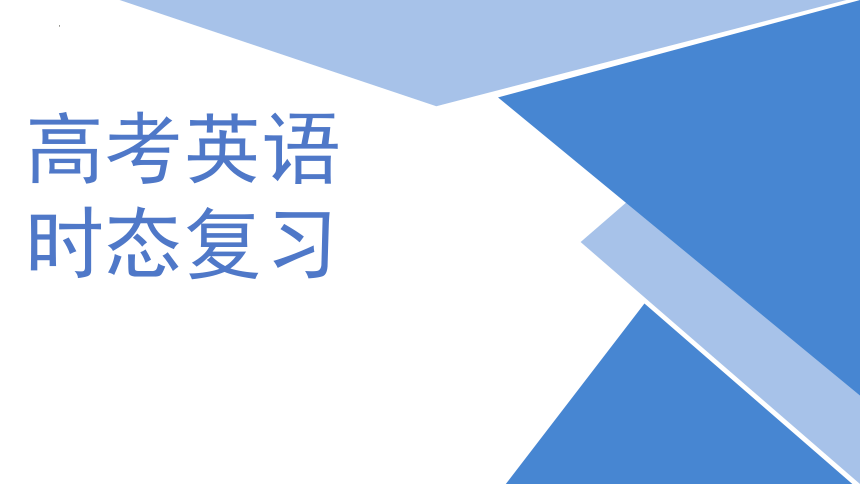 | |
| 格式 | pptx | ||
| 文件大小 | 157.1KB | ||
| 资源类型 | 教案 | ||
| 版本资源 | 通用版 | ||
| 科目 | 英语 | ||
| 更新时间 | 2023-09-08 13:20:25 | ||
图片预览

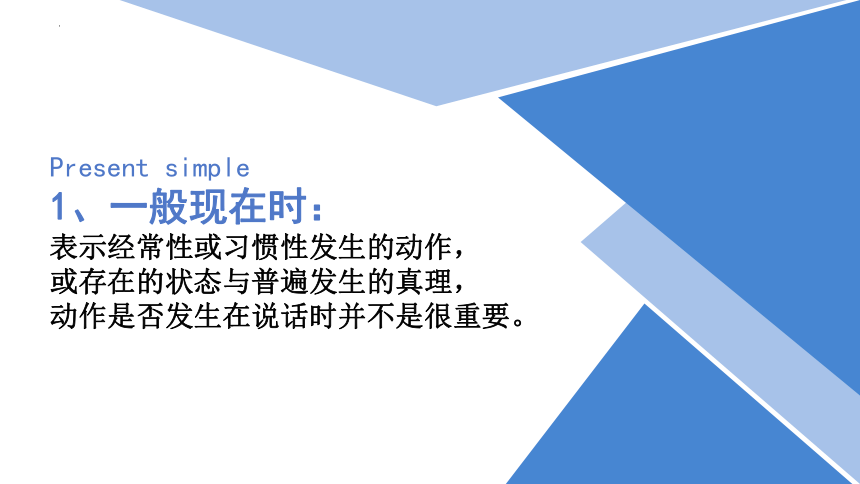
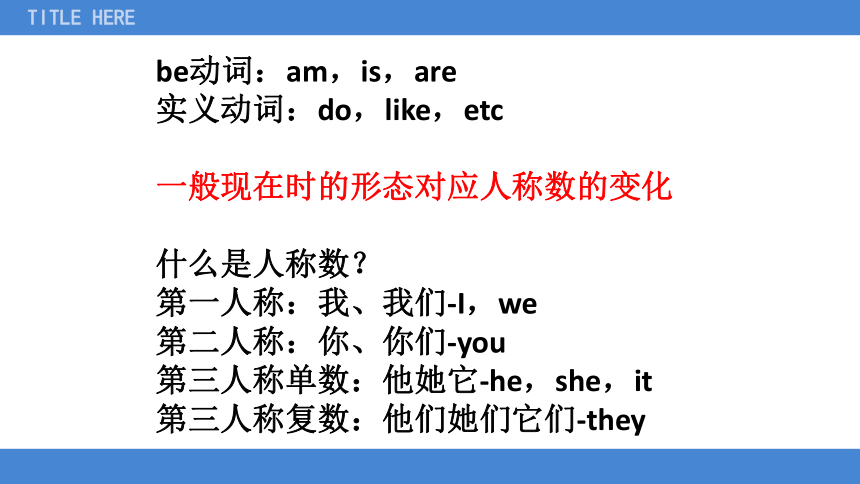
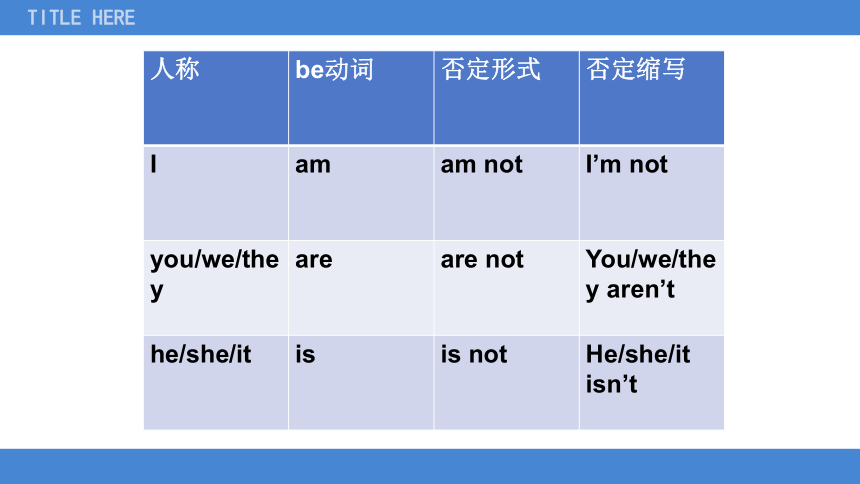
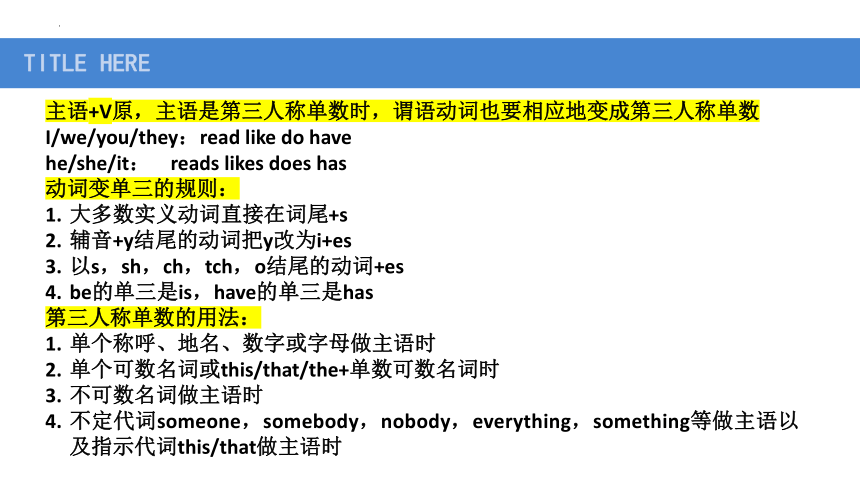
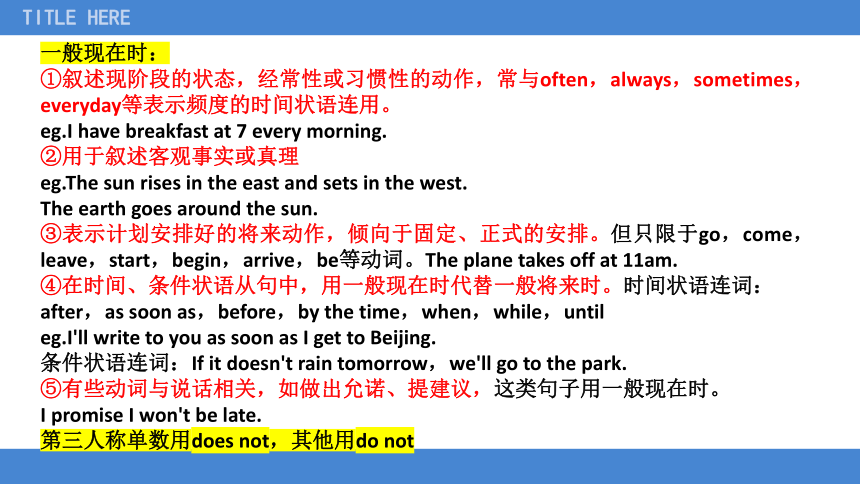
文档简介
(共13张PPT)
高考英语
时态复习
1、一般现在时:
表示经常性或习惯性发生的动作,
或存在的状态与普遍发生的真理,
动作是否发生在说话时并不是很重要。
Present simple
01
02
03
04
TITLE HERE
be动词:am,is,are
实义动词:do,like,etc
一般现在时的形态对应人称数的变化
什么是人称数?
第一人称:我、我们-I,we
第二人称:你、你们-you
第三人称单数:他她它-he,she,it
第三人称复数:他们她们它们-they
TITLE HERE
人称 be动词 否定形式 否定缩写
I am am not I’m not
you/we/they are are not You/we/they aren’t
he/she/it is is not He/she/it isn’t
TITLE HERE
主语+V原,主语是第三人称单数时,谓语动词也要相应地变成第三人称单数
I/we/you/they:read like do have
he/she/it: reads likes does has
动词变单三的规则:
大多数实义动词直接在词尾+s
辅音+y结尾的动词把y改为i+es
以s,sh,ch,tch,o结尾的动词+es
be的单三是is,have的单三是has
第三人称单数的用法:
单个称呼、地名、数字或字母做主语时
单个可数名词或this/that/the+单数可数名词时
不可数名词做主语时
不定代词someone,somebody,nobody,everything,something等做主语以及指示代词this/that做主语时
TITLE HERE
一般现在时:
①叙述现阶段的状态,经常性或习惯性的动作,常与often,always,sometimes,everyday等表示频度的时间状语连用。
eg.I have breakfast at 7 every morning.
②用于叙述客观事实或真理
eg.The sun rises in the east and sets in the west.
The earth goes around the sun.
③表示计划安排好的将来动作,倾向于固定、正式的安排。但只限于go,come,leave,start,begin,arrive,be等动词。The plane takes off at 11am.
④在时间、条件状语从句中,用一般现在时代替一般将来时。时间状语连词:
after,as soon as,before,by the time,when,while,until
eg.I'll write to you as soon as I get to Beijing.
条件状语连词:If it doesn't rain tomorrow,we'll go to the park.
⑤有些动词与说话相关,如做出允诺、提建议,这类句子用一般现在时。
I promise I won't be late.
第三人称单数用does not,其他用do not
2、一般过去时:
表示过去某个时间发生的动作
或存在的状态,也可以表示
过去经常或反复发生的动作。
Past simple
TITLE HERE
一般过去时常和表示过去的时间状语连用:yesterday,last year,in2018…
be动词:was were
be动词的形态对应人称数的变化
实义动词:do work like,etc
主语+V过去式:They watched TV last night.
TITLE HERE
人称 Be动词 否定形式
I/he/she/it was was not(wasn’t)
We/you/they were were not(weren’t)
TITLE HERE
动词变过去式的规则:
①大多数实义动词在词尾+ed,有e就+d。
work-worked,love-loved
②以辅音字母+y结尾的把y改为ied
study-studied
③末尾只有一个辅音字母的重读闭音节,双写该辅音字母+ed
stop-stopped
助动词did后面+V原
eg.I did not(didn't) like go out.
TITLE HERE
动词v.过去式的不规则变形
begin---began
break---broke find---found fall---fell write---wrote
bring---brought get---got leave---left take---took
build---built give---gave lose---lost speak---spoke
buy---bought go---went make---made sleep---slept
catch---caught have---had meet---met sit---sat
do---did hear---heard pay---paid sell---sold
eat---ate know---knew put---put see---saw
TITLE HERE
特殊疑问句:
特殊疑问词+一般疑问句(语序)?
What did you do last night?
Where do you go every morning
When did you go to the library
Who do you go with
How did you go home
THANKS FOR YOUR WATCHING
高考英语
时态复习
1、一般现在时:
表示经常性或习惯性发生的动作,
或存在的状态与普遍发生的真理,
动作是否发生在说话时并不是很重要。
Present simple
01
02
03
04
TITLE HERE
be动词:am,is,are
实义动词:do,like,etc
一般现在时的形态对应人称数的变化
什么是人称数?
第一人称:我、我们-I,we
第二人称:你、你们-you
第三人称单数:他她它-he,she,it
第三人称复数:他们她们它们-they
TITLE HERE
人称 be动词 否定形式 否定缩写
I am am not I’m not
you/we/they are are not You/we/they aren’t
he/she/it is is not He/she/it isn’t
TITLE HERE
主语+V原,主语是第三人称单数时,谓语动词也要相应地变成第三人称单数
I/we/you/they:read like do have
he/she/it: reads likes does has
动词变单三的规则:
大多数实义动词直接在词尾+s
辅音+y结尾的动词把y改为i+es
以s,sh,ch,tch,o结尾的动词+es
be的单三是is,have的单三是has
第三人称单数的用法:
单个称呼、地名、数字或字母做主语时
单个可数名词或this/that/the+单数可数名词时
不可数名词做主语时
不定代词someone,somebody,nobody,everything,something等做主语以及指示代词this/that做主语时
TITLE HERE
一般现在时:
①叙述现阶段的状态,经常性或习惯性的动作,常与often,always,sometimes,everyday等表示频度的时间状语连用。
eg.I have breakfast at 7 every morning.
②用于叙述客观事实或真理
eg.The sun rises in the east and sets in the west.
The earth goes around the sun.
③表示计划安排好的将来动作,倾向于固定、正式的安排。但只限于go,come,leave,start,begin,arrive,be等动词。The plane takes off at 11am.
④在时间、条件状语从句中,用一般现在时代替一般将来时。时间状语连词:
after,as soon as,before,by the time,when,while,until
eg.I'll write to you as soon as I get to Beijing.
条件状语连词:If it doesn't rain tomorrow,we'll go to the park.
⑤有些动词与说话相关,如做出允诺、提建议,这类句子用一般现在时。
I promise I won't be late.
第三人称单数用does not,其他用do not
2、一般过去时:
表示过去某个时间发生的动作
或存在的状态,也可以表示
过去经常或反复发生的动作。
Past simple
TITLE HERE
一般过去时常和表示过去的时间状语连用:yesterday,last year,in2018…
be动词:was were
be动词的形态对应人称数的变化
实义动词:do work like,etc
主语+V过去式:They watched TV last night.
TITLE HERE
人称 Be动词 否定形式
I/he/she/it was was not(wasn’t)
We/you/they were were not(weren’t)
TITLE HERE
动词变过去式的规则:
①大多数实义动词在词尾+ed,有e就+d。
work-worked,love-loved
②以辅音字母+y结尾的把y改为ied
study-studied
③末尾只有一个辅音字母的重读闭音节,双写该辅音字母+ed
stop-stopped
助动词did后面+V原
eg.I did not(didn't) like go out.
TITLE HERE
动词v.过去式的不规则变形
begin---began
break---broke find---found fall---fell write---wrote
bring---brought get---got leave---left take---took
build---built give---gave lose---lost speak---spoke
buy---bought go---went make---made sleep---slept
catch---caught have---had meet---met sit---sat
do---did hear---heard pay---paid sell---sold
eat---ate know---knew put---put see---saw
TITLE HERE
特殊疑问句:
特殊疑问词+一般疑问句(语序)?
What did you do last night?
Where do you go every morning
When did you go to the library
Who do you go with
How did you go home
THANKS FOR YOUR WATCHING
